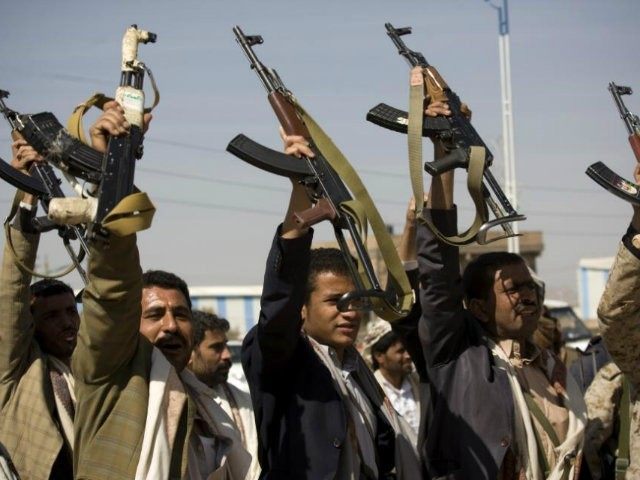The United Nations Security Council on Tuesday decided to impose an arms embargo on Iran-backed Houthi rebels in Yemen and their allies, including former President Ali Abdullah Saleh and his son.
This comes after a UN spokesperson, quoting information provided by the UN Office for the Coordination of Humanitarian Affairs (OCHA), said that Saudi Arabia-led airstrikes against suspected Houthi targets have led to the evacuation of more than 120,000 people in Yemen.
Since March 26, when the Saudi-led campaign began bombing Yemen, the Houthis have been able to gain territory in Yemen.
The UN reportedly said that at least 736 combatants and civilians have been killed since the Saudi-led airstrikes began and 2,700 others have been injured.
Other officials believe the casualty toll is higher.
“In addition to hundreds of fighters, at least 364 civilians are reported to have lost their lives since March 26, including at least 84 children and 25 women. Another 681 civilians – possibly more – have been injured,” notes the UN. “Dozens of public buildings, including hospitals, schools, airports and mosques have been destroyed in airstrikes, through shelling and other attacks”
The UN announced the arms embargo imposed on April 14.
“Alarmed at the military escalation by Houthis in many parts of Yemen and the ‘significant and rapidly deteriorating’ humanitarian situation, the United Nations Security Council today approved an arms embargo against the rebel group’s leadership and demanded that all parties refrain from unilateral actions that could undermine the country’s UN-facilitated political transition,” states a UN press release.
“The measure was approved through a new resolution adopted by a vote of 14 in favor, with one abstention (Russia). The text demanded that Houthis immediately and unconditionally end violence, withdraw forces from areas they have seized, relinquish all arms, cease activities undermining the authority of the country’s legitimate Government, refrain from provocation against neighboring States, release the Defense Minister, General Mahmoud al-Subaihi, and end the recruitment of children,” it adds.
On the ground in Yemen, armed groups affiliated with the internationally recognized Yemeni President Abd Rabbo Mansour Hadi have been fighting the Iranian-backed Houthi rebels who have joined forces with military units loyal to former Yemeni President Saleh.
The UN Security Council resolution also imposes sanctions on Abdul Malik al-Houthi and two other senior rebel leaders, Abd al-Khaliq al-Houthi and Abdullah Yahya al-Hakim.
Mr. Saleh’s son Ahmed, who has also been subjected to sanctions, is a former commander of the elite Republican Guard force.
The U.S. has said it is expediting arms supplies and increasing intelligence sharing with the Saudi-led coalition.
America has accused Iran of providing military aid to the Houthi rebels, allegations that both Iran and the Houthis deny.
Also on Tuesday, the UN high commissioner for human rights called for an inquiry into civilian casualties in Yemen.
“Every hour we are receiving and documenting deeply disturbing and distressing reports of the toll that this conflict is taking on civilian lives and infrastructure,” said United Nations High Commissioner for Human Rights Zeid Ra’ad Al Hussein. “Such a heavy civilian death toll ought to be a clear indication to all parties to this conflict that there may be serious problems in the conduct of hostilities.”
“The parties to the conflict are obliged to ensure that international humanitarian law and international human rights law are scrupulously respected and that the civilian population is protected,” added Mr. Zeid. “Any suspected breach of international law must be urgently investigated with a view to ensuring victims’ right to justice and redress and to ensure that such incidents do not recur.”
On Monday, Stephane Dujarric, a UN spokesman, said that more than 120,000 people have been evacuated as a result of the conflict in Yemen.
“In Abyan [alone], more than 1,730 displaced families are living temporarily in schools, in host communities or with family and relatives,” he said.
“Landlines and cell phone networks are no longer working in some areas in Aden, Abyan and Al Dhale’e. People in Aden and Al Mukalla have experienced prolonged power outages lasting up to twelve hours,” continued Dujarric.
“Humanitarian partners are providing assistance, including water tanks, water trucking, rehabilitation of water and sanitation facilities, and medical clinics and stand ready to provide more as soon as roads are re-open,” he added.
Follow Edwin Mora on Twitter: @EdwinMora83.

COMMENTS
Please let us know if you're having issues with commenting.